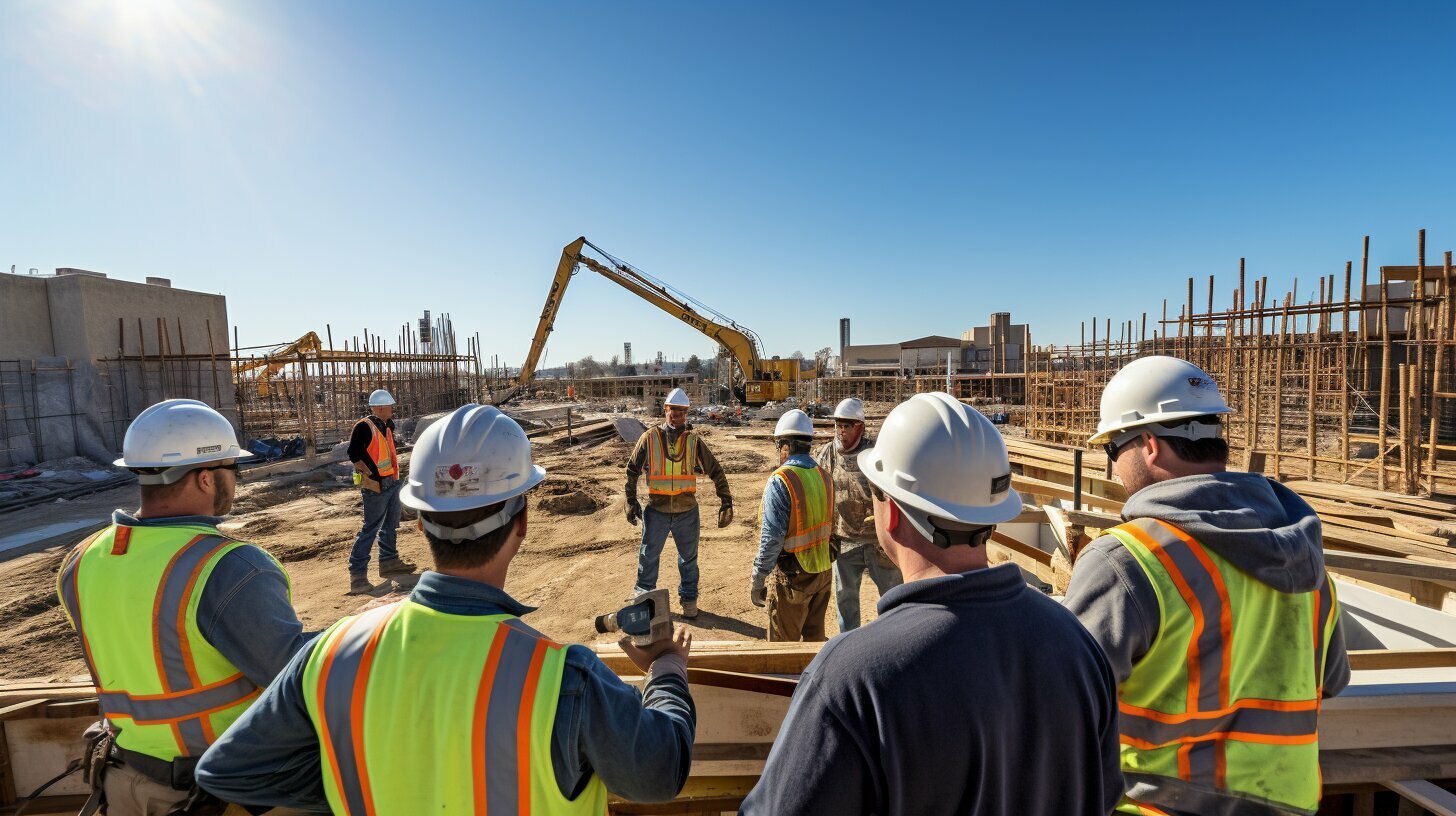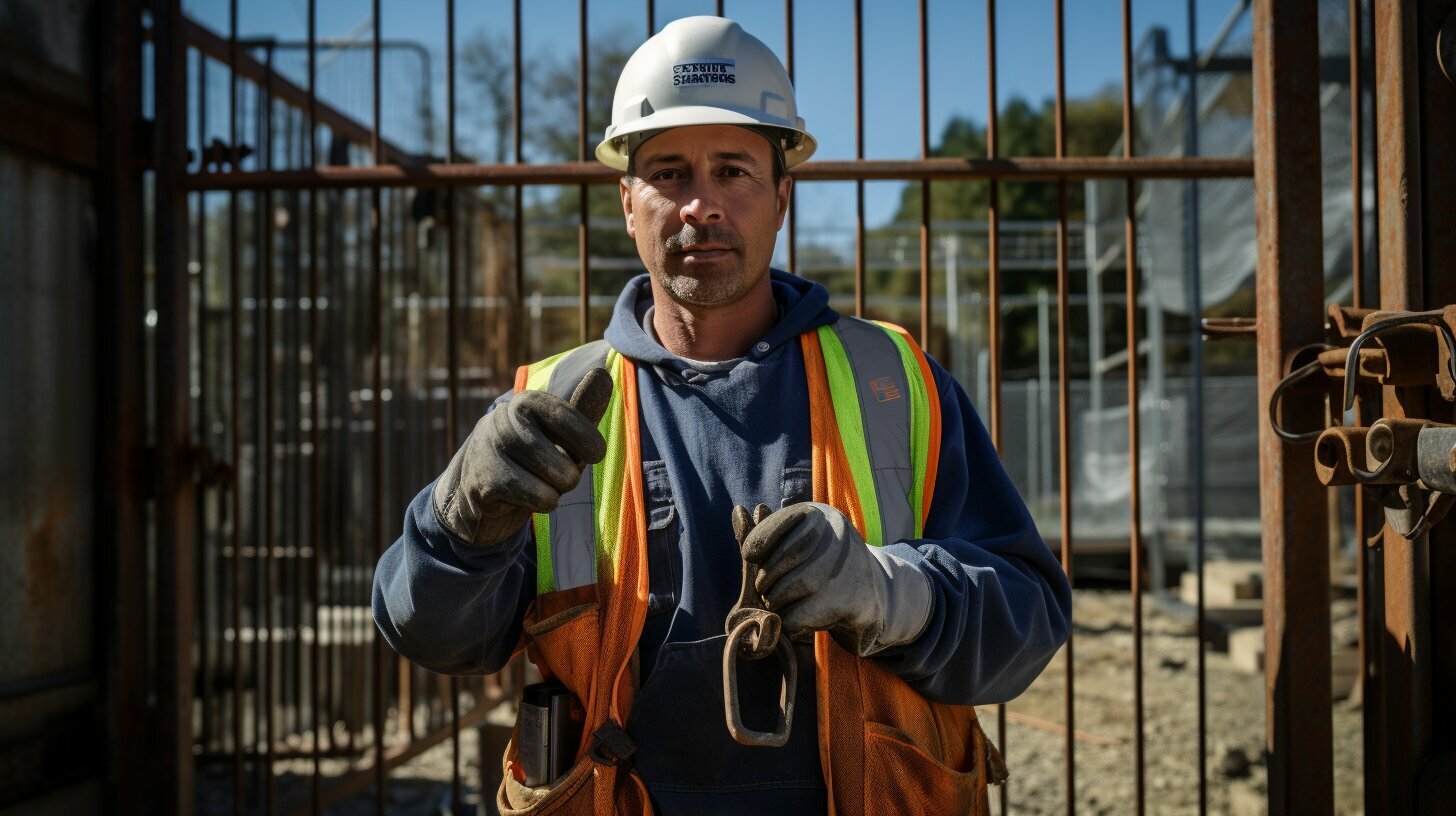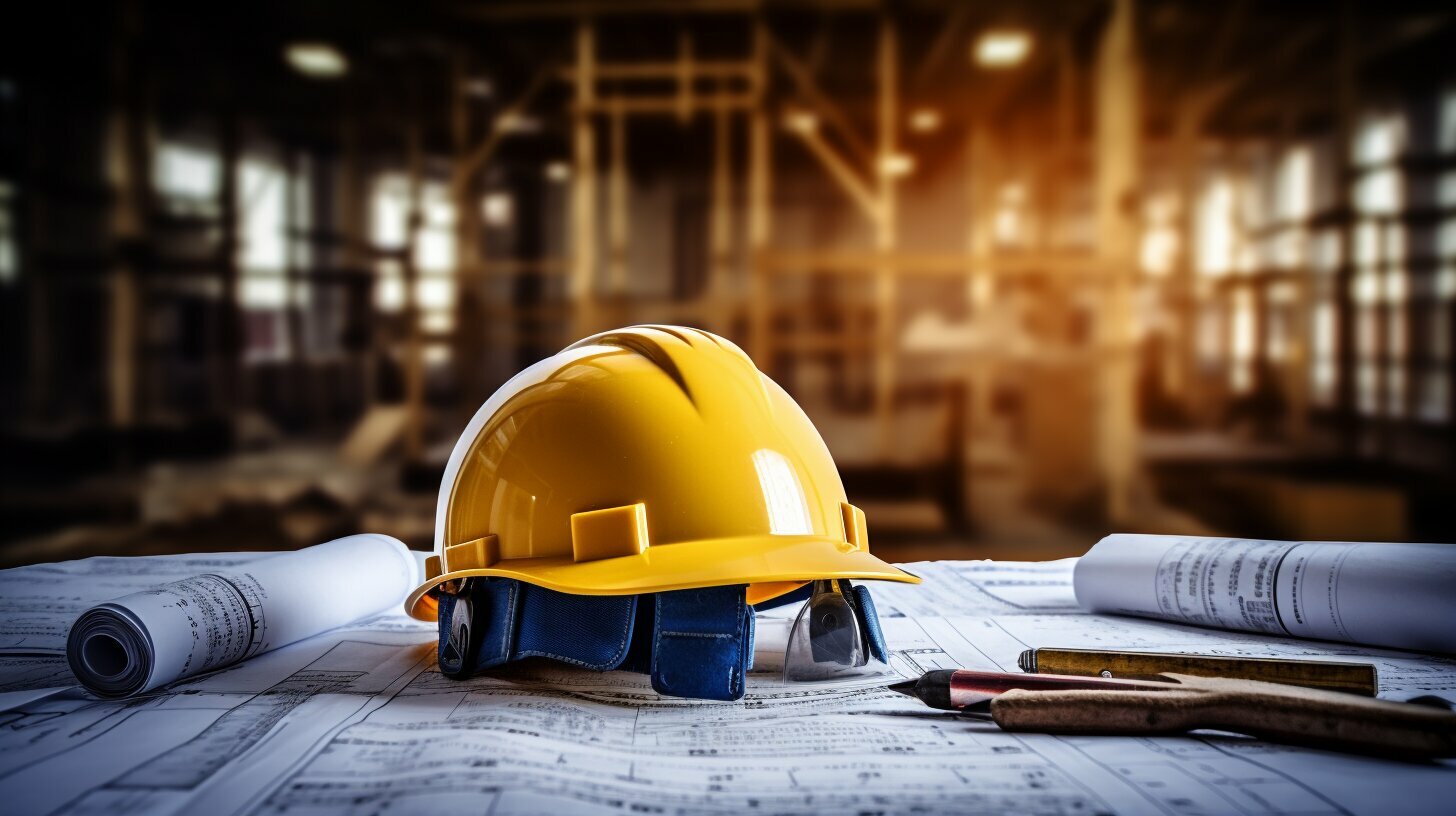
General contractors play a crucial role in the construction industry, overseeing projects and ensuring their successful completion. They are responsible for coordinating subcontractors, managing budgets, maintaining quality control, obtaining permits, and handling communication between all parties involved. Whether it’s a commercial or residential project, hiring a licensed general contractor is essential for meeting code requirements and protecting against potential legal issues. In this article, we will explore the roles, responsibilities, and tasks of general contractors, as well as the benefits of hiring them for construction projects.
Key Takeaways:
- General contractors are responsible for overseeing construction projects and ensuring their successful completion.
- They coordinate subcontractors, manage budgets, maintain quality control, and obtain necessary permits.
- General contractors handle tasks such as providing utilities on-site and disposing of construction waste.
- Hiring a licensed general contractor is important to meet code requirements and protect against legal issues.
- They play a different role than construction managers, who are involved in the pre-construction and design phase.
Responsibilities of General Contractors
When it comes to construction projects, general contractors have a wide range of responsibilities that they must handle. These professionals play a crucial role in overseeing the entire project, ensuring its smooth execution, and delivering quality results. Let’s explore some of the key duties and tasks that general contractors are responsible for:
- Coordinating subcontractors: General contractors are responsible for managing and coordinating the various subcontractors involved in the project. This includes scheduling their work, ensuring they have the necessary resources, and overseeing their performance.
- Managing the budget: General contractors are tasked with creating and managing the project budget. They must estimate costs, control expenses, and ensure that the project stays within the allocated budget.
- Maintaining quality control: General contractors are responsible for ensuring that the construction work meets the highest quality standards. They monitor the progress of the project, conduct inspections, and address any quality issues that arise.
- Obtaining necessary permits: General contractors handle the paperwork required to obtain the necessary permits and approvals for the construction project. They are familiar with the local regulations and ensure compliance at all times.
- Handling communication: General contractors act as the main point of contact between the client, subcontractors, suppliers, and other stakeholders. They facilitate effective communication and ensure that everyone is on the same page.
These are just a few examples of the many responsibilities that general contractors take on. By shouldering these duties, they play a crucial role in keeping construction projects on track, ensuring their successful completion, and delivering high-quality results.
Table: General Contractor Responsibilities
| Responsibilities | Description |
|---|---|
| Coordinating subcontractors | Manage and coordinate the work of subcontractors, ensuring smooth collaboration and timely completion of tasks. |
| Managing the budget | Create and control the project budget, ensuring that expenses are kept within the allocated funds. |
| Maintaining quality control | Monitor the progress of the project, conduct inspections, and address any quality issues that arise to ensure high-quality construction work. |
| Obtaining necessary permits | Handle the paperwork and comply with all regulatory requirements to obtain the necessary permits and approvals for the project. |
| Handling communication | Act as the main point of contact between the client, subcontractors, suppliers, and other stakeholders to ensure effective communication. |
As you can see, a general contractor’s responsibilities encompass various critical aspects of a construction project. Their expertise and ability to manage these responsibilities efficiently are essential for the successful completion of any construction endeavor.
Services Provided by General Contractors
General contractors offer a comprehensive range of services to ensure the smooth execution of construction projects. Their expertise and experience in the field make them invaluable in managing all aspects of the project, from start to finish. Here are some of the key services that general contractors provide:
- Coordinating Subcontractors: General contractors take charge of coordinating various subcontractors involved in the project, such as electricians, plumbers, and carpenters. They ensure that each subcontractor is properly scheduled and that their work is synchronized to avoid delays or conflicts.
- Managing Budget and Quality Control: General contractors are responsible for managing the project budget, ensuring that costs are controlled, and making sure that the work meets quality standards. They closely monitor the progress of the project, checking for any defects or errors and taking corrective actions, if necessary.
- Obtaining Necessary Permits: General contractors handle the paperwork involved in obtaining the necessary permits and approvals from local authorities. They have an understanding of the regulations and codes that need to be followed, ensuring that the project complies with all legal requirements.
- Handling Communication: General contractors act as the main point of contact for all parties involved in the project, including the property owner, subcontractors, architects, and suppliers. They facilitate effective communication, ensuring that everyone is updated on the progress and any changes or issues that may arise.
In addition to these services, general contractors also help with site logistics, such as providing utilities and managing the disposal of construction waste. They play a crucial role in maintaining a safe and efficient work environment, adhering to industry best practices and regulations.
Table: Services Provided by General Contractors
| Service | Description |
|---|---|
| Coordinating Subcontractors | Managing and scheduling various subcontractors involved in the project. |
| Managing Budget and Quality Control | Controlling project costs and ensuring work meets quality standards. |
| Obtaining Necessary Permits | Handling the paperwork and legal requirements for permits and approvals. |
| Handling Communication | Acting as the main point of contact and facilitating effective communication. |
| Site Logistics | Providing utilities, managing waste disposal, and ensuring a safe work environment. |
When undertaking a construction project, hiring a licensed general contractor is highly recommended. Their expertise and ability to oversee the entire project ensure that it is completed efficiently, on time, and within budget. By taking on the responsibilities of coordinating subcontractors, managing the budget, obtaining necessary permits, and handling communication, general contractors help alleviate the stress and complexities associated with construction projects.
Whether it’s a commercial or residential project, a general contractor’s skill set and knowledge are instrumental in delivering successful outcomes. With their experience, they ensure that the project is executed to the highest quality standards and in compliance with all applicable regulations and codes. By entrusting the construction project to a general contractor, property owners can have peace of mind knowing that professionals are at the helm, ensuring a smooth and successful execution.
General Contractors in Commercial and Residential Projects
General contractors can be involved in both commercial and residential projects, each with its own unique set of considerations. Commercial general contractors specialize in managing construction projects for commercial properties, such as office buildings, retail spaces, and hotels. They have experience in handling larger-scale projects that often require complex infrastructure and compliance with specific regulations.
Residential general contractors, on the other hand, focus on construction projects for homes and residential properties. They are skilled in working with homeowners to bring their vision to life and ensure that the project meets their specific needs and preferences. Residential projects often involve renovations, additions, or new home construction.
Whether it’s a commercial or residential project, general contractors play a crucial role in overseeing the entire construction process. They are responsible for managing subcontractors, ensuring that the project stays on schedule and within budget, and maintaining quality control. General contractors also handle the logistics of the project, including obtaining necessary permits, coordinating deliveries, and managing communication between all parties involved.
Each type of project comes with its own set of challenges and considerations. Commercial projects may involve working with multiple stakeholders, adhering to strict building codes, and meeting the specific requirements of the industry. Residential projects, on the other hand, require a deep understanding of residential construction practices, as well as effective communication and collaboration with homeowners. Ultimately, both commercial and residential general contractors bring their expertise to the table and ensure that the construction project is completed successfully.
Table: Comparison between Commercial and Residential General Contractors
| Aspect | Commercial General Contractors | Residential General Contractors |
|---|---|---|
| Project Size | Large-scale construction projects | Small to medium-sized residential projects |
| Regulations and Codes | Compliance with industry-specific regulations | Adherence to residential building codes |
| Stakeholders | Multiple stakeholders, including property owners, architects, and tenants | Direct collaboration with homeowners |
| Project Timeline | Often longer due to the complexity of commercial projects | Typically shorter for residential projects |
| Scope of Work | Infrastructure, HVAC, plumbing, electrical, etc. | Home renovations, additions, new constructions |
Benefits of Hiring a General Contractor
Hiring a general contractor offers numerous advantages, making it a wise choice for larger projects that require multiple subcontractors and permits. By entrusting the coordination and management of your construction project to a skilled professional, you can ensure a smoother and more efficient process from start to finish.
One of the key benefits of working with a general contractor is their expertise and experience in the industry. They have the knowledge and understanding of construction processes, materials, and regulations, allowing them to make informed decisions and provide valuable guidance throughout the project. Their expertise also extends to managing subcontractors, ensuring that all tasks are completed in a timely and coordinated manner.
Additionally, a general contractor brings value in terms of project coordination and quality control. They oversee the entire construction process, from scheduling and budgeting to site safety and inspections. This comprehensive approach ensures that all aspects of the project are well-managed, minimizing delays and ensuring that the work meets the required standards.
Table: Advantages of Hiring a General Contractor
| Advantages | Description |
|---|---|
| Efficient Project Management | A general contractor manages all aspects of the project, ensuring smooth coordination and timely completion. |
| Expertise in Construction | General contractors have extensive industry knowledge, allowing them to make informed decisions and provide valuable guidance. |
| Coordination of Subcontractors | General contractors effectively manage subcontractors, ensuring tasks are completed in a coordinated manner. |
| Quality Control | General contractors ensure that the work meets the required standards and passes all necessary inspections. |
Furthermore, hiring a licensed general contractor provides an added layer of protection against potential legal issues. They are familiar with local building codes and regulations and are responsible for ensuring that the project complies with these requirements. This can save you from costly legal complications that may arise from non-compliance.
While a general contractor may have an additional cost, their ability to navigate the complexities of a construction project, manage subcontractors, and maintain quality control can ultimately save you time, money, and stress. Their expertise and dedication to delivering successful projects make them an invaluable asset for any construction endeavor.
Conclusion
In conclusion, general contractors play a vital role in the successful execution of construction projects, ensuring coordination, quality control, and timely completion. They oversee the project from start to finish, acting as the main point of contact for all involved parties. Their responsibilities include managing the budget, coordinating with subcontractors and vendors, and obtaining necessary permits. Additionally, general contractors handle communication between all parties, ensuring that everyone is on the same page and working towards the common goal of completing the project.
One of the key benefits of hiring a general contractor is their expertise and experience in the construction industry. They have extensive knowledge of building codes, regulations, and best practices, which helps to ensure that the project meets all necessary requirements. General contractors also have established relationships with subcontractors and vendors, allowing for efficient coordination and collaboration throughout the construction process.
Furthermore, general contractors provide valuable project management skills, overseeing the entire construction process to maintain quality and meet deadlines. They are responsible for monitoring the progress of the project, addressing any issues that arise, and making necessary adjustments to keep the project on track. Their attention to detail and focus on quality control help to ensure that the final result meets or exceeds expectations.
Whether it’s a commercial or residential project, hiring a licensed general contractor is essential. Their expertise, knowledge, and ability to manage and coordinate all aspects of the project lead to a smoother construction process and a successful outcome. By entrusting the project to a general contractor, property owners can have peace of mind knowing that their project is in capable hands.
FAQ
What do general contractors do?
General contractors are responsible for overseeing construction projects, coordinating with subcontractors and vendors, managing the budget, maintaining quality control, and ensuring the project is completed on time. They also handle tasks such as obtaining permits, providing utilities on the site, disposing of construction waste, and managing communication between all parties involved.
What are the responsibilities of general contractors?
General contractors have various responsibilities, including coordinating subcontractors, managing the budget, maintaining quality control, obtaining necessary permits, and handling communication between all parties involved in the project.
What services do general contractors provide?
General contractors provide services such as obtaining permits, providing utilities on the site, disposing of construction waste, and managing overall project logistics.
What is the difference between general contractors in commercial and residential projects?
General contractors working on commercial projects and residential projects have different requirements and scopes of work. Commercial projects often involve larger-scale projects, while residential projects typically focus on individual homes or smaller-scale renovations.
What are the benefits of hiring a general contractor?
Hiring a general contractor brings expertise, efficient management of subcontractors, and value in terms of project coordination and quality control. They ensure that the work meets code requirements and protect against potential legal issues.
continue reading
Related Posts
Obtaining a general contractor license is a crucial step towards […]
Acquiring a general contractor license involves a multi-step journey that […]
A general contractor plays a crucial role in construction projects, […]




